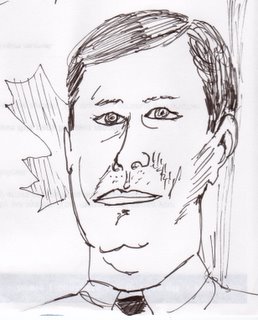We Call Him "Prime Minister" Now

It’s been over a decade in Canada, but with the swearing in of Stephen Harper as the 22nd Prime Minister, we have a Conservative government again.
It will be a challenging government, just like the one before it –the second minority government in a row, but Harper seems to be expressing to us that less is more: by downsizing parliament and doing away with departments like the gun registry, his intended message is to save more taxpayer dollars.
It is a smaller government composed of 27 members, down from Martin’s 39 in 2004. Harper’s opinion is that this will be a “more focused and more effective” government, saying that the ministries “reflect Canada”, coming from diverse backgrounds, including MP’s from each province except PEI, who had no Tory MP’s. Harper will have to do some consensus-building with all the provinces, though it may not be easy and everyone is waiting anxiously to see just how it will work out.
The cabinet is composed of nine Ontario MP’s, including Tony Clement, who previously served as Health Minister under Tory leaders Mike Harris and Ernie Eves, and four MP’s from each Western province. It also includes the first parliamentarian of Japanese heritage, Bev Oda, who will look after Canadian Heritage and the Status of Women.
Harper’s first bill to be passed is predictably the Federal Accountability Act, which prevents past government members from becoming government lobbyists for at least five years. This will apparently break up alliances which would otherwise cause ethical dilemmas.
But which, if any, alliances are operating now?
When Belinda Stronach jumped parties to join the Liberals last year, frankly, people were upset. She was called all sorts of things, among them: ‘a turncoat.’ It was surprising that she won her riding in this recent election! However, it seems she may have paved the way for other politicians to do the same thing. Dave Emmerson surprised everyone today by switching over to be Conservative minister of international trade after being elected in Vancouver as Liberal in both the 2004 and 2006 elections. He served the Martin government as Liberal industry minister, but as Harper says: “obviously that service is over.” Emmerson justified his move suggesting he’ll join the Tories based on the checks and balances that Harper has infused into the governmental system.
In contrast to the weakened powers of government though, while Harper seemed to promote an elected cabinet, he was criticized for appointing unelected candidate Mike Fortier as new minister of public works. Harper justified this by saying he needed to have someone from Québec (Fortier is from Montréal). Fortier was also the co-chair of Harper’s Conservative party leadership campaign that he won in 2004. His appointment as Senate is to be only “temporary” and that he must step down to other contestants. So Harper can claim that this position will eventually be an elected position, but not until the next Federal election, meaning that for this government, it won’t be. Fortier will not be forced to run for a by-election.
Supposedly a “diverse” cabinet, only six women filled Tory seats, dropping 2-4 percent of what the Paul Martin government had from 2003-4.
They include Edmonton Tory Rona Ambrose, who holds impressive language skills and is the youngest Tory member. She becomes environment minister. Marjory LeBreton served under Brian Mulroney and in Harper’s election campaign. She was elected as the senior Senate leader position.
Former Deputy Opposition Minister and Nova Scotia MP Peter McKay becomes Minister of Atlantic Canada Opportunities Agency and also becomes Foreign Affairs Minister. The Atlantic Canada Opportunities Agency is an organization started in 1987 which supports programs to revive Eastern-Canadian economy and create jobs. One initiative is to help the fishing industries which have suffered mixed threats of negative media attention over food safety, disease, mismanagement and over harvesting. Their report suggests that aquaculture output will surpass beef production worldwide by 2010. So the ACOA’s initiatives include reinforcing the benefit of proximity to the US market, sustainability, developing alternative finfish industries in the Atlantic Provinces, better systems of labeling, subsidies and research.
The sponsorship scandal was like a landmine planted in the Liberal party just waiting to go off. It brought Paul Martin’s reign down and destroyed the party's credibility, because he was the finance minister who approved the programs found to have wasted millions of dollars of taxpayers money. Martin quietly resigned and said his goodbyes today.
Hopefully Harper will use some strategies to involve all MP’s in a cooperative government and heal the political wounds that have plagued us for the past two years.
Filed under News Reviews



2 Comments:
lol, thanks for the vote of confidence!
I like how he appointed an unelected cabinet minister to Senate, while at the same time a key facet of his campaign platform was to end the appointment of senators and make them elected and accountable. Hypocrisy kicks ass.
Post a Comment
<< Home